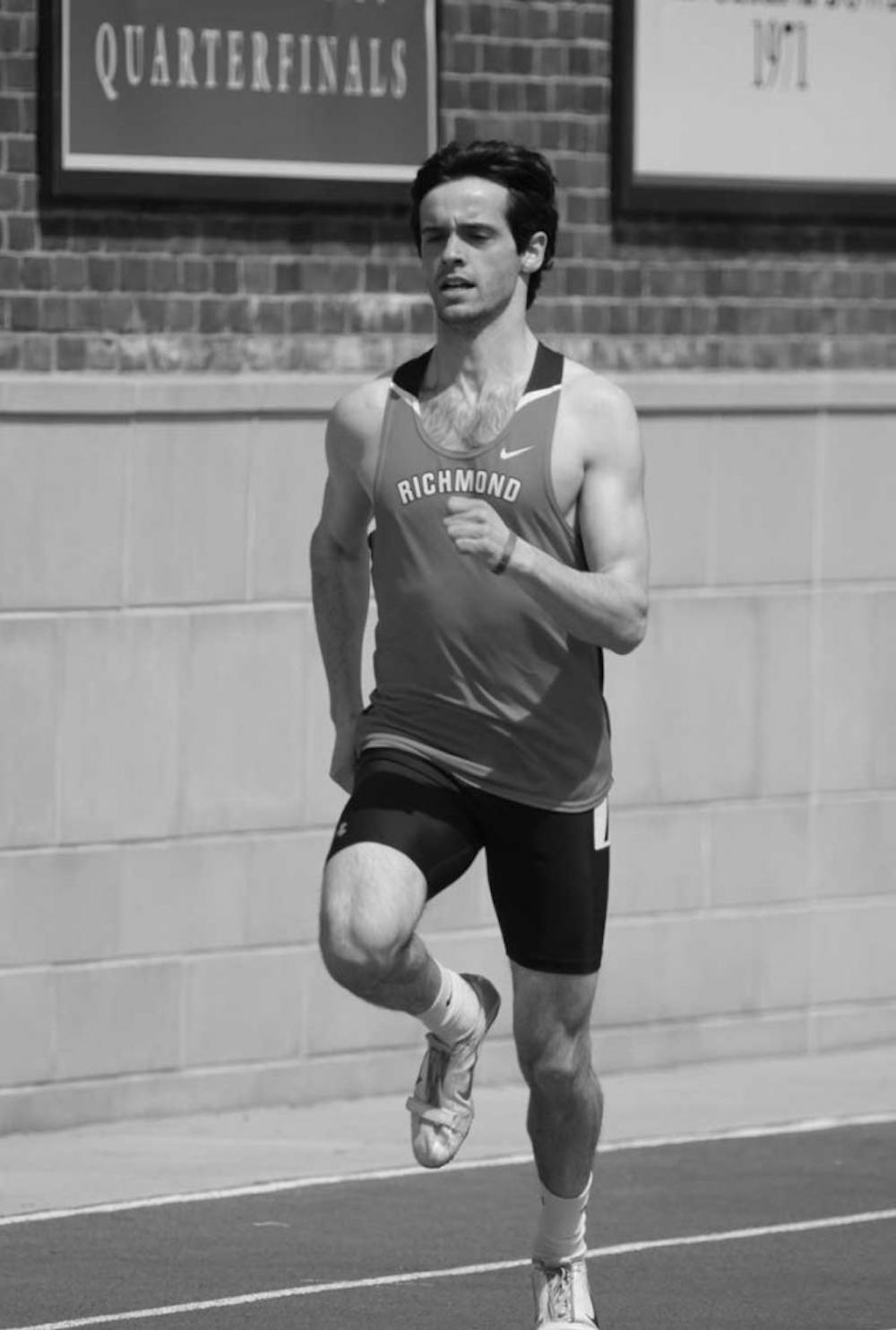The men's track and field team raced against the dying of the light Friday and Saturday in its final home meet as a program, the eighth annual Fred Hardy Invitational at Robins Stadium.
In a meet of more than a dozen colleges and featuring many former Olympians, the Richmond men narrowly missed winning two events: the 3,000 meter and 4-x-800-meter relay. In the 3,000 meter, junior Ryan Lee finished less than two seconds behind the winner for second place in 8:30.23, and junior Adam Owens finished fourth in 8:36.51. The relay team of sophomore Matthew Groff, senior Jason Skipper, freshman Justin Keefe and sophomore Paul Myer led the whole race but the last 60 meters, also finishing in second place by less than two seconds.
The women's team also competed this weekend. Sophomore Taylor Clevinger and junior Alyson McGonigle finished first and second, respectively, in the 800 meter. Their times were 2:11.10 and 2:12.03. Freshman Mary Allen finished first in the 400 meter in 55.92 among collegiate athletes and was named Atlantic 10 Rookie of the Week. Clevinger and McGonigle joined seniors Lydia Morton and Stephanie Paradis to win the 4-x-800-meter relay in 9:04.84.
The women had several second-place finishes, too: Paradis in the 1,500 meter, sophomore Clare Moretz in the 3,000 meter and junior Molly Parsons in the 5,000 meter.
But this meet was more than just results for the men. It was a display of a team running with more passion than ever, though its demise is near, and standing against the program being cut, said John Ciccarelli, who graduated in 2006 after running long distance for Richmond.
"This type of decision could be made to cut anything -- even academic or funded extra-curricular activities, even those that are defining people's college experiences," Ciccarelli said.
"It's a bad precedent to set if certain people can say, 'I don't want this or that anymore. Get rid of it,' despite the interests of students, faculty, staff and alumni. Where do we draw the line? We need to find ways to have input in these decisions."
Senior Jose Edgington, who ran the 800 meter, agreed that displaying passion and effort was crucial to his team's success and sustainability.
"We ran these races like the last race we're ever going to run," Edgington said, "representing Richmond here for the last time and competing against some of the best teams around."
It was important for the team not to give up on or off the track and to remain together in its quest for reinstatement, he said.
"We need to keep talking with the administration and keep publicizing it -- the more attention this has, the more the administration will be willing to change it," Edgington said. "It was definitely the administration not thinking about the implication cutting track would have on cross-country and athletics as a whole. They didn't speak with us and didn't involve us in the process."
For his part in this weekend's meet, Edgington said he had wanted to set some personal records, as well as cheer on his teammates who would go on to the Atlantic 10 Outdoor Track and Field Championships. The strong sophomore and freshman classes and the incoming class will determine the fate of the cross-country team, he said.
Enjoy what you're reading?
Signup for our newsletter
"Because they are taking away spots on the track team but not actually cutting cross-country runners, they're actually adding to the student-athlete ratio, which is contradictory to what some of the administration has said in trying to decrease that ratio," Stubbs said. "There's been a lack of transparency and an administration that's not reevaluating decisions once they get the appropriate information or considering reversing those decisions."
Ciccarelli agreed that the administration had not taken a proper approach to the matter.
"We don't feel the administration considered all the facts," he said. "If they're being honest about athletic reorganization goals, we don't see how keeping track and field is difficult, and it goes against those goals."
Raising awareness of what has transpired would lead to a greater realization of what a travesty this is, Stubbs said. Reinstating this program could improve the image of Richmond and its administration, he said.
Stubbs and Ciccarelli said that they do not blame lacrosse at all, but that it should not have been a factor in cutting outdoor track and field.
"We acknowledge roster constraints and welcome a lacrosse team to expand opportunities, but there are no such considerations to reinstate this outdoor track team," Stubbs said. "Never mind the contributions this team makes: look at the scholar-athletes this team is producing, the RCSGA president, doctors, lawyers and teachers at all different levels. You're looking at a team that's been recognized for a decade for academic success throughout the country. These are the kinds of people giving back, and it's being neglected.
"And this program went from not doing anything great in 2002 to winning championships and getting to top 25 in the country in 2010, without a penny of scholarship money. Isn't that the ultimate goal of collegiate athletics? If we're true to our goals as an academic institution, how were these students anything but the pinnacle of student-athletes?"
Contact reporter Zak Kerr at zak.kerr@richmond.edu
Support independent student media
You can make a tax-deductible donation by clicking the button below, which takes you to our secure PayPal account. The page is set up to receive contributions in whatever amount you designate. We look forward to using the money we raise to further our mission of providing honest and accurate information to students, faculty, staff, alumni and others in the general public.
Donate Now



